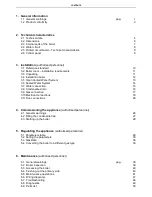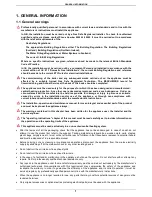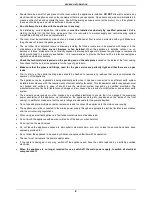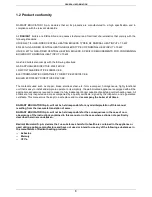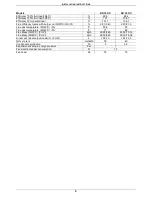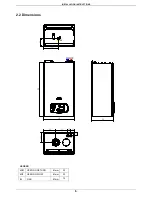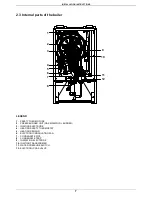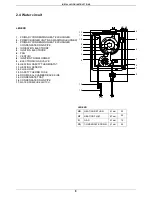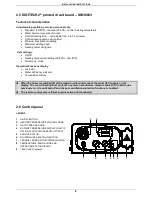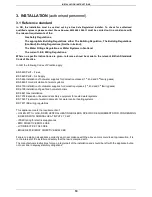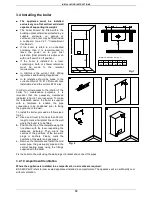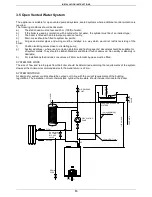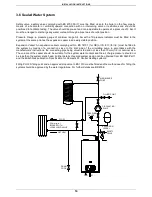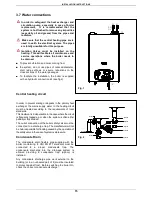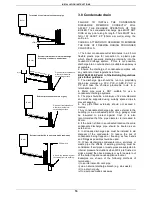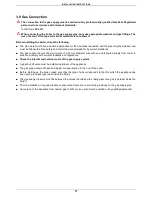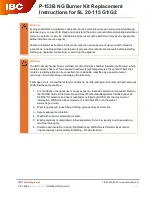
GENERAL INFORMATION
2
•
Should there be a smell of gas present in the room where the appliance is installed, DO NOT attempt to activate any
electric switches, telephones or any other equipment that may cause sparks. Open doors and windows immediately to
create a current of air and ventilate the room. Shut-off the main gas supply valve (at the meter), or on the cylinder in
the case of bottled gas, and call an authorised service centre.
•
Do not attempt to interfere with the appliance in any way.
•
As dictated by current legislation, this appliance must be installed exclusively by qualified personnel. Before
starting the boiler for the first time, make sure that it is connected to a water supply and central heating system
compatible with its performance characteristics.
•
The room must be ventilated by means of an air intake positioned at floor level and protected with a grill. Make sure
the grill does not reduce the passage section.
•
The air inflow from adjacent rooms is allowed providing that those rooms are in depression with respect to the
atmosphere and that there are not fireplace or fan installed. When the appliance is installed outdoor, i.e. on
balcony or terrace, make sure it is not directly exposed to atmospheric agents to prevent any damage to components
which would lead to a warranty invalidation. It is recommended to provide the boiler with a protective casing/box
against bad whether conditions.
•
Check the technical data reported on the packing and on the data plate located on the inside of the front casing.
Also check that the burner is appropriate for the type of gas to burn.
•
Make sure that the pipes and fittings used for the gas service are perfectly tight and that there are no gas
leaks.
•
Prior to start-up, the central heating pipes should be flushed to remove any residues that could compromise the
operation of the appliance.
•
The appliance can be regarded as being electrically safe when it has been connected to an efficient earth system
installed in accordance with the requirements of current safety standards. This fundamental safety requirement must
be checked and verified. In case of doubt, have the electrical system checked by a qualified electrician. The
manufacturer will not be held liable for any damage or injury caused as a result of an ineffective or non-existent earth
system.
•
The domestic power supply must be checked by a qualified electrician to ensure that it can support the maximum
power absorption of the appliance, as indicated on the appliance data plate (positioned on the inside of the front
casing). In particular, make sure that the cable ratings are adequate for the power absorbed.
•
Do not use adapters; multiple sockets or extension leads to connect the appliance to the mains power supply.
•
The appliance must be connected to the mains power supply through an appropriate electrical isolator in accordance
with the current wiring regulations.
•
When using an electrical appliance, a few fundamental rules must be observed:
•
Do not touch the appliance with damp or wet parts of the body or when barefoot
•
Do not pull on the electric wires
•
Do not leave the appliance exposed to atmospheric elements (rain, sun, etc,) unless these conditions have been
expressly provided for.
•
Do not allow the appliance to be used by children or anyone unfamiliar with its operation.
•
The user must not replace the power supply cable.
•
If the cable is damaged in any way, switch off the appliance and have the cable replaced by a suitably qualified
electrician.
•
When the appliance is no longer required for use, switch off the main power supply, to switch all electrical
components off.



